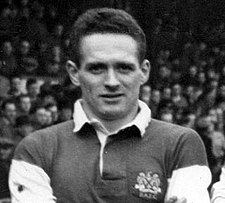Neil Dougall
 |
|||
| Personal information | |||
|---|---|---|---|
| Full name | Cornelius Dougall | ||
| Date of birth | 7 November 1921 | ||
| Place of birth | Falkirk, Scotland | ||
| Date of death | 1 December 2009 (aged 88) | ||
| Place of death | Plymouth, England | ||
| Height | 5 ft 10 in (1.78 m) | ||
| Playing position | Inside right / Wing half | ||
| Youth career | |||
| 1936–1940 | Burnley | ||
| Senior career* | |||
| Years | Team | Apps | (Gls) |
| 1940–1945 | Burnley | 0 | (0) |
| 1945–1949 | Birmingham City | 93 | (15) |
| 1949–1959 | Plymouth Argyle | 275 | (26) |
| Total | 368 | (41) | |
| National team | |||
| 1946 | Scotland | 1 | (0) |
| Teams managed | |||
| 1961 | Plymouth Argyle | ||
|
* Senior club appearances and goals counted for the domestic league only. |
|||
* Senior club appearances and goals counted for the domestic league only.
Cornelius Dougall (7 November 1921 – 1 December 2009), commonly known as Neil Dougall, was a Scottish professional footballer who played as an inside right or wing half. He played more than 350 games in the Football League and won one cap for Scotland.
Dougall was born in Falkirk, Scotland. He began his football career as a schoolboy inside-right at Burnley in 1936, turning professional in 1940. After the Second World War he moved to Birmingham City for a fee of £2,750. He helped the club to that season's Football League South war league championship and the Second Division championship two years later. While a Birmingham player, he won one full cap for Scotland, against Wales in 1946, and represented his country in a Victory international against England and in the Bolton disaster fundraising match, playing opposite his clubmate Frank Mitchell.
He transferred to Plymouth Argyle in March 1949 for a fee of £13,000, was converted to wing half, and spent the remainder of his playing career at the club, making nearly 300 appearances in all competitions, before he retired in March 1959. With Plymouth he won a Third Division South championship medal in 1952 and a Third Division championship medal in 1959. He was awarded a testimonial match against Burnley, the club where he started his career and where his father Billy had been both player and manager. He qualified as a coach and became player-coach to Plymouth's reserve team, succeeded Jack Rowley as team manager for an eight-month spell, and performed various coaching roles at the club until 1969.
...
Wikipedia
